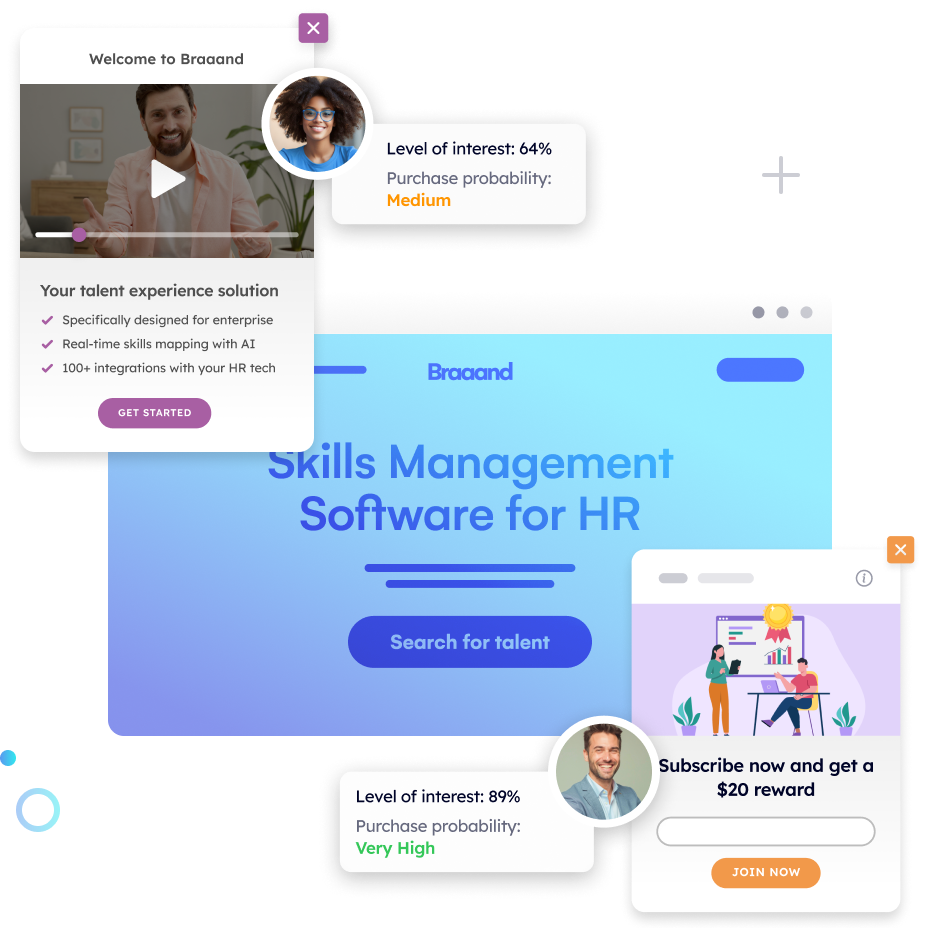
As marketers, we are often caught up in the craziness of our day-to-day activities. However, there is great value in pausing for a second to reflect on the journey—both our own and those who have walked similar paths before us.
In our podcast, Pathmonk Presents, we’ve had the privilege of speaking with accomplished and insightful marketers in the industry. They’ve faced challenges, seized opportunities, and, perhaps most importantly, learned from both their successes and failures. During each episode, we asked them a simple yet profound question: What is the one piece of advice you would give yourself if you were to restart your journey as a marketer today?
Their answers offer marketing advice for both experienced professionals and those just starting in the field. It’s a rare opportunity to learn from those who have been where you are and have achieved the success you aspire to. Follow along 👇
Table of Contents
1. Luke Renner from Cyngn: “Fail faster”
“I think one of the biggest lessons I’ve learned as I’ve come up in my role as head of marketing for a publicly traded company is probably just to fail faster. You know, the more experiments you can run on your team, the sooner you can turn things off that aren’t working and double down on things that are.
Especially when you’re at a young company, the work is really to figure out which of those tactics are going to work best for your business. And as soon as you can answer that question, that’s when you really start to see the step changes that legends are made of, I guess.”
2. Robert Garcia from Pnuema: “I would learn about David Ogilvy and Bill Burnett as early as possible”
“I would learn about David Ogilvy and Bill Burnett as early as possible. I’ve often said that digital marketing history has been like the wild, wild west for a long time. But if you notice, it’s taking a turn toward marketing patterns that we’ve seen many times before. We’re using all of the terms that famous admen, like in the Mad Men show from 40 years ago, used: KPIs, MRRs, average value per customer—all those terms, they’ve been using them for years.
Two of the most famous people that came out of that super adman era were David Ogilvy and Bill Burnett. David Ogilvy sold the first Rolls Royce in advertising in the United States. They came to him saying, ‘We need a way to sell Rolls Royces here.’
He and his team sat with the Rolls Royce for three days, measuring, looking up, looking down, turning the car on and off, driving the car, and they came up with probably the coolest selling line I’ve ever heard in my life. After all that data, they said, ‘The loudest thing in a Rolls Royce is the clock.’ Boom. They created long-form advertising and things like that. Really great mind as far as data.
Bill Burnett believed in data too, but his main thing was, and this was his saying, ‘Let’s make good art, good writing, good layout, good selling.’ So it was that part that reminded people that we are visual, we are auditory, we smell, and we read. So, data and art—those two things are a perfect match for a digital marketer today. And I wish I had started early learning about those two guys.”
3. Carol Bettencourt from Chyron: “Be very strategic in building alliances”
“Two things I would say are to be very strategic in building alliances. I think of myself as a problem solver, and at certain points in my life and in various aspects of the careers I’ve had, I keep my head down and get the job done. As a leader, I mentor others, and they get the job done.
But that’s not all there is to it. If you’re part of an organization, and that organization is part of an industry, I would say be very strategic and intentional about building alliances.
The second thing is, as someone coming up through any industry, you’re trying to prove yourself. The impulse is to say yes to things, to impress people. But I would also tell people, please consider saying no. Your time is valuable, so be mindful of what you say yes to.”
4. Shishir Bhanot from Pulse Advertising: “You’ve got to love what you do”
“I know it sounds very, very cheesy, but I truly think you’ve got to love what you do. Because you end up spending at least 40 hours a week on what you do. As I said, it doesn’t come to everyone, and that’s fine. But if you can find it, okay, this is something I really enjoy. I think I’ll be good at it. It doesn’t mean that I have all good days. There are a lot of days when it’s bad, and there are a lot of days when I’m challenging myself, cursing myself, and really figuring out and doubting myself.
But the core of it is that, okay, I really enjoy what I do. I take a lot of ownership in my tasks. I take a lot of pride in my work. I think that’s something I would always advise: if you can find that, that’s amazing. Beyond that, I think just to be bold, take more risks. You will make mistakes. It’s a fact. And, as we also mentioned before, continue learning because it’s such an expanding field, with AI now even more. The challenges are super, super high, but the opportunity is higher, definitely.”
5. Caleb Clark from Hook and Ladder Digital: “Double the impact with half the effort”
“Double the impact with half the effort. Do way fewer things, but do them deeper. And for those fewer things, just make sure that there is an undeniable linear relationship between those activities and the business case. So less focus on doing things for the sake of doing them—not to optimize for impressions, engagement, and growth, but to actually solve a business case.
So I would do way, way, way fewer things and just do them simpler and deeper. I would build our strategy on a napkin as compared to a 15-page document. I wish I could have done that, but here we are. So.”
6. Dylan Touhey from One Net Inc: “Focus on the basics and the fundamentals”
“So I think that the marketing world, and particularly the digital marketing world, is opaque and unnecessarily complicated, driven by a lot of people with a lot of opinions and very little experience. It’s very confusing.
If I could give advice to my 22-year-old self coming out of university and getting into digital marketing, it would be to just focus on the basics and fundamentals, which really haven’t changed since the early days of print media. They still work today in a digital context. The fundamentals of hook, story, offer as they pertain to advertising; the fundamentals of positioning and differentiation; the importance of building a brand over the long haul.
In B2B lead gen, we always focus on just filling CRM pipelines, but you can’t do that if you don’t have any brand awareness in the marketplace. At least it’s extremely hard to do so. Just understanding the fundamental levers in marketing and applying that to digital, while almost ignoring a lot of the bad advice and noise in the marketplace—I think that would be the advice I’d give to my 22-year-old self, for sure.”
7. Josh McNicholas from Evalu-8: “Surround yourself with a company that has a large marketing department, so you can learn from everyone”
“For a first job, join a very large B2B SaaS company and learn from everyone. Surround yourself with a company that has a large marketing department, so you can learn from everyone. I didn’t do that. I started off on my own, fresh out of university, working with businesses, and that is a regret I have. I feel like my growth curve could have been much quicker and much better had I surrounded myself with others who knew more than me.”
8. Christina O’Reilly from Pythian: “Making sure that your data set is as clean as possible from the beginning”
“I worked with a lot of startups as well as enterprise organizations. At the end of the day, as marketers, we always know that data is invaluable and important. But I think it’s crucial to truly hone in on making sure that your data set is as clean as possible from the beginning. With the advent and introduction of so many new technologies and tools, it’s now more important than ever to not just gather the data, but to ensure you understand how to apply it. So, the analytical side of it is important.
The second point is more on the personal side. As a leader, I do a lot of mentoring outside of my organization and, of course, within my own team. One piece of advice I would have for up-and-coming marketers is to lean in, trust your gut, and take advantage of as much training as possible—whether at your organization or through the free training available—because technology is only going to get faster and faster. Being on top of AI and all these new advances in technology is really critical for today’s marketer.”
9. Amber Spencer from Damon Motorcycles: “It’s okay not to know everything”
“The one piece of advice I’d give myself is that it’s okay not to know everything. As a junior marketer, I stressed myself out because I felt I didn’t have enough knowledge or didn’t know how to do things. I’d tell myself not to worry. There are always people willing to help, and you don’t need to know everything early in your career. Experience and working on different projects bring knowledge. Don’t stress about having all the experience because nobody expects that of you except yourself.”
10. Meenank Minnu from Hey Digital: “Look at companies that are boring and start there”
“The number one thing you need to do as a marketer is to look at companies that are boring and start there. Boring companies are getting the work done. They’re not busy showcasing how shiny they are, how good they are, etc. See what the company is doing in terms of their marketing efforts. Because if they’re not doing a lot, chances are that the founder or someone in leadership doesn’t believe in marketing.
That’s a huge red flag for you because you will end up spending more time convincing the founder of marketing’s value and managing their expectations instead of focusing on the marketing activities. So 100%, you need a founder who believes in marketing, is willing to spend on marketing, and is willing to measure marketing the right way rather than just asking, ‘Okay, we are doing social media. Where are the clicks coming in?'”
On top of the incredible interviews you saw here, you can check the full list of Pathmonk Presents episodes here. New episodes are coming out everyday, stay tuned on our LinkedIn and don’t miss a thing!
—
Pathmonk: Empowering Marketers Improve Their Conversions with AI
What do these top marketing leaders have in common?
They understand a successful marketing strategy is not just about traffic acquisition. Relying solely on getting traffic and then hoping it would turn into some decent leads will not make your business succeed.
Instead, they know the most effective marketing is about squeezing every possible result from all those visitors who are already on your page.
Pathmonk makes it possible with personalized website experiences that match each one of your users’ intent, showing them what they need to see to become customers. The results? Your conversion rate can improve up to 8x, with average results of 50% increases. That means for every 100 sales generated on your website, you could easily get 150 by just implementing Pathmonk. And the best part is that you don’t even have to lift a finger!
If you want to give Pathmonk a go, you can:
- Try our interactive personalized demo (it’s free and doesn’t involve Sales calls 😉)
- Book a product tour with our team (recommended if you want to know more about the product)
Or directly set up your account and start boosting your conversions (perfect for busy marketers that know what they need)
Increase +180% conversions from your website with AI
Get more conversions from your existing traffic by delivering personalized experiences in real time.
- Adapt your website to each visitor’s intent automatically
- Increase conversions without redesigns or dev work
- Turn anonymous traffic into revenue at scale


